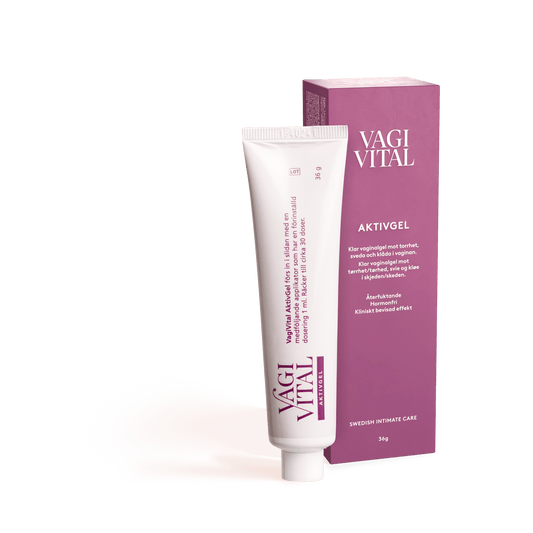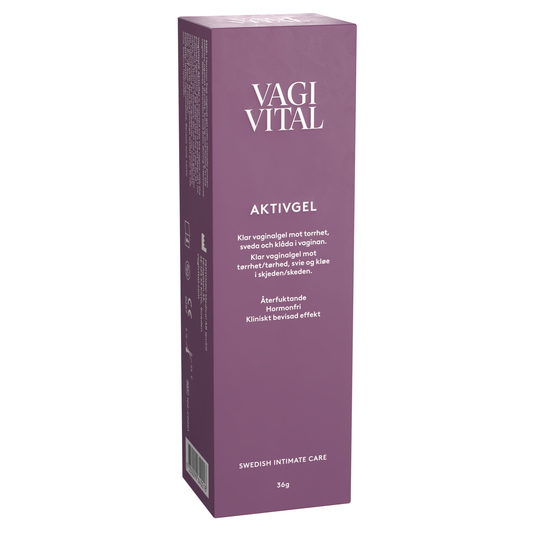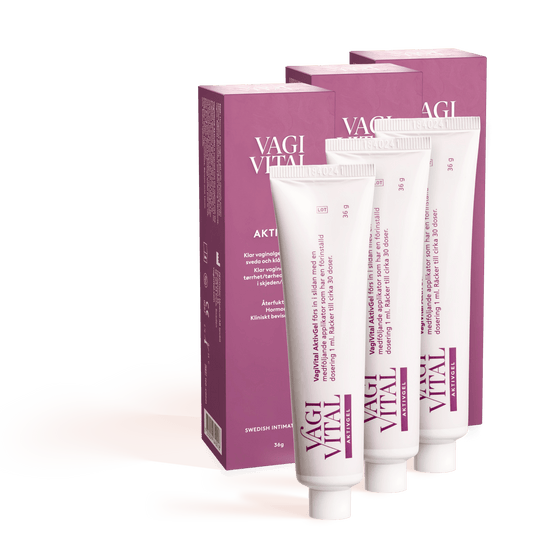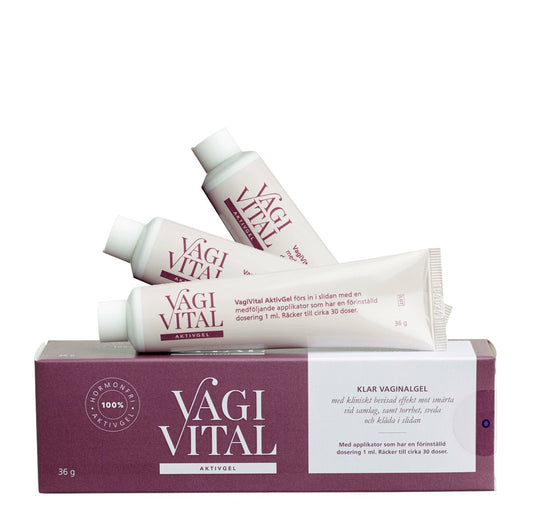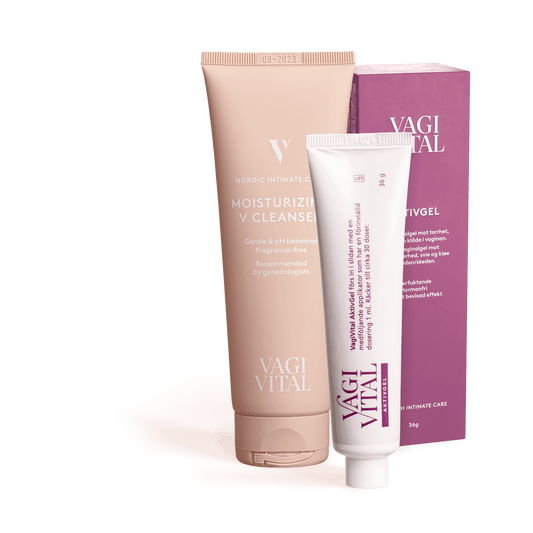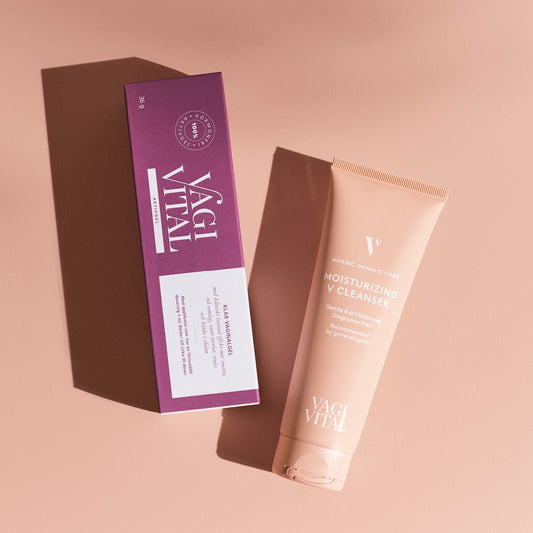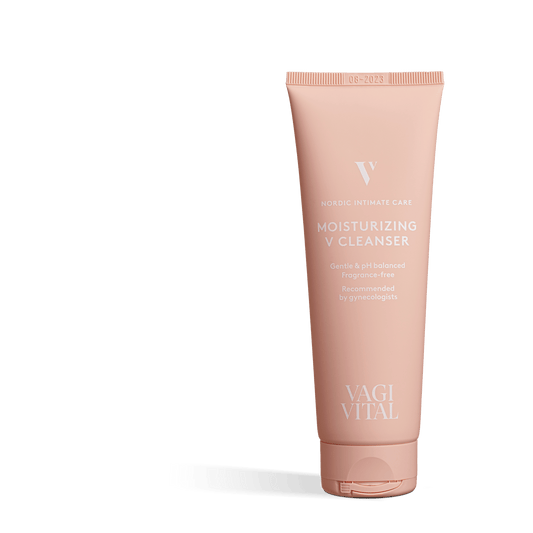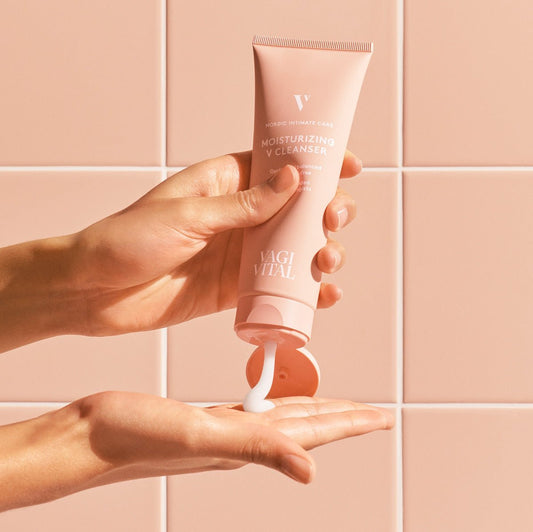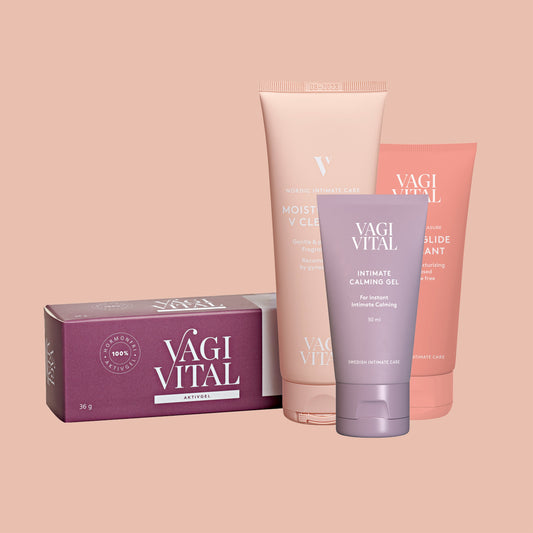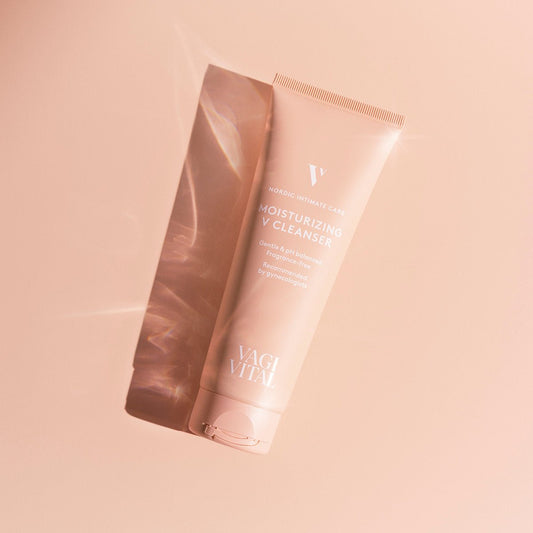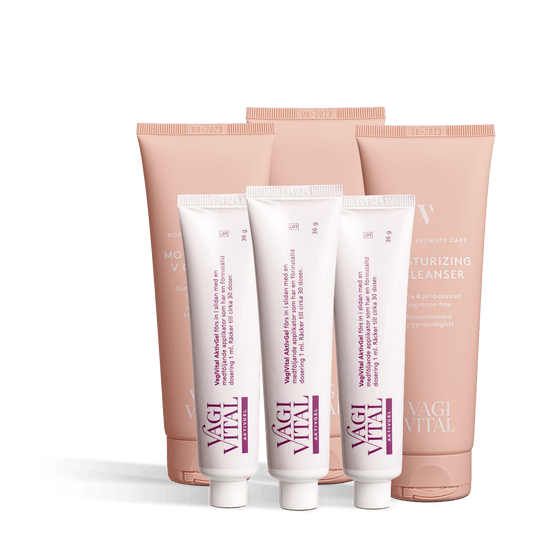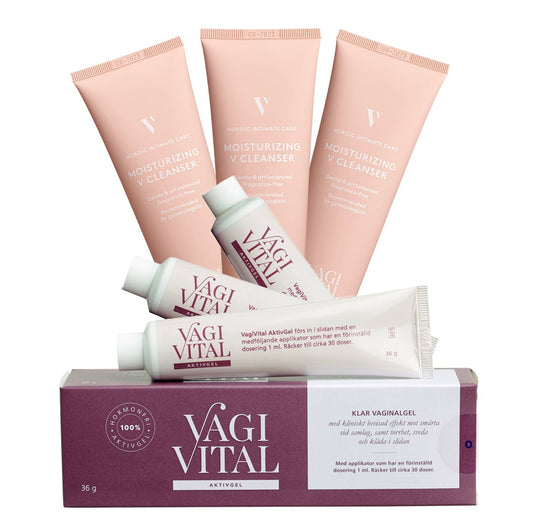Gut Health and Vaginal Health – What’s the Connection?
You may have heard of the vaginal microbiome. But did you know that what happens in your gut can also affect your vagina? An increasing number of studies show that the gut and the vaginal area are closely linked – especially when it comes to bacteria, immunity, and hormone balance. An imbalance in your gut flora can, for example, increase the risk of bacterial vaginosis, dry mucous membranes, and irritation in the intimate area. So what actually happens in the body when the gut is out of balance? And what can you do to support both your digestive and vaginal well-being?
THE GUT AND THE VAGINA – A DYNAMIC INTERACTION BETWEEN TWO MICROBIOMES
Your gut is home to over 100 trillion bacteria – both beneficial and less desirable. When the balance between them is disrupted, it doesn’t just affect digestion – it can impact your entire body, including your vaginal health. Many of the bacteria that thrive in the gut can travel to the vulva and vagina – especially when the mucous membranes are dry and fragile. This includes E. coli, a common culprit behind urinary tract infections. At the same time, a well-balanced gut flora helps regulate the immune system and protects against inflammation throughout the body – including in the vaginal area.
WHAT DOES THE RESEARCH SAY?
The connection between gut flora and vaginal health is no longer just a theory – it’s a field where research is expanding rapidly. Numerous international studies have identified clear links between the gut microbiome and the balance of the vaginal environment. Here are three key findings:
1. Low Diversity in Gut Flora Can Disrupt Vaginal Balance
When researchers refer to “low diversity” in the gut microbiome, they mean there are too few types of beneficial bacteria. This kind of imbalance makes the body more vulnerable – to both inflammation and infections. Studies show that women with low microbial diversity in the gut are more likely to experience vaginal imbalances, such as bacterial vaginosis. Bacterial vaginosis is the most common vaginal infection among women of reproductive age, but it also occurs during menopause – especially in women with dry or sensitive mucous membranes.
2. Gut Flora Supports Hormonal Balance
The gut microbiome also plays a key role in hormonal regulation – particularly when it comes to estrogen. Certain gut bacteria can break down and recirculate estrogen, which is essential for keeping the vaginal mucosa hydrated and functioning properly. If the gut flora is imbalanced, estrogen metabolism can be negatively affected – which in turn can lead to dryness, irritation, and increased susceptibility to infections.
VagiVital AktivGel treats vaginal dryness locally – completely hormone-free. It’s clinically proven and studied at Swedish university hospitals, and can also be used alongside hormone therapy if needed.
Buy AktivGel here
3. Gut and Vagina – Two Microbiomes in Close Communication
The gut and the vagina are different microbial environments, but they’re deeply interconnected. During pregnancy, breastfeeding, and menopause, hormonal changes affect both gut and vaginal flora. In some cases, researchers have even found identical bacterial species in both environments – indicating that the two systems interact more than previously thought. This means a gut imbalance can affect the vagina – and vice versa. That’s why it’s essential to treat the body as a whole and give both the gut and the intimate area the support they need for balance.
DRY MUCOSA AND IMBALANCE – A VICIOUS CYCLE
When estrogen levels drop – as during menopause – both the gut and vaginal microbiomes become more sensitive. Dry mucous membranes weaken the body’s defense against harmful bacteria. This is when many women start to experience irritation, burning, recurring infections, or a general sense of discomfort. It’s easy to assume that the solution lies only in the vaginal area – but in reality, it may start with your gut.
💡 A balanced gut microbiome → stronger immune system 💡 A stronger immune system → less inflammation in mucous membranes 💡 Less inflammation → fewer infections, reduced irritation, and more comfort
WHAT CAN YOU DO TO PROMOTE BALANCE?
Research shows a clear link between gut flora and vaginal health – and the good news is, you can influence it. With small changes in diet, lifestyle, and intimate care, you can give your body a better foundation for well-being. Here are some helpful steps:
🌸 Eat a varied, high-fiber diet – vegetables, whole grains, legumes, and berries nourish the good bacteria
🌸 Avoid sugar and processed foods – which encourage overgrowth of unwanted bacteria
🌸 Add fermented foods – like yogurt with live cultures, sauerkraut, or kefir
🌸 Take probiotics – especially Lactobacillus strains that support both gut and vaginal flora 🌸 Support your vaginal environment locally – by hydrating and strengthening the mucosa
Many women using VagiVital AktivGel notice significant improvement – not just in dryness, but also in irritation and sensitivity. The gel delivers deep hydration, reinforces the mucosal barrier, and fosters a healthy environment for beneficial bacteria. And don’t forget the importance of gentle cleansing. VagiVital V Cleanser is a 100% soap-free intimate wash, specially developed for sensitive mucous membranes. It’s made with the same unique hydrating formula as AktivGel – and is so mild it doesn’t even need to be rinsed off. Perfect for daily intimate care that helps maintain balance.
Buy the Hydrating Intimate Care Kit with 1 AktivGel and 1 Cleanser and get 10% off here
REMEMBER: YOU ARE A WHOLE SYSTEM
It’s easy to think of the vaginal area as a separate system – but your body is fully connected. When your gut is in good shape, the rest of your body tends to follow – including your vagina. That’s why it’s a great idea to combine a fiber-rich, probiotic-friendly diet with gentle, hydrating intimate care – like VagiVital AktivGel, VagiVital V Cleanser, or Calming Gel. Together, these steps give your body the best chance at maintaining healthy balance. Your gut and your vagina are in constant conversation – more than you might think. Listen to them – and help them thrive together ❤
Sources: ¹ Anahtar MN, Gootenberg DB, Mitchell CM, Kwon DS. “Vaginal microbiota: composition and role in reproductive health.” Journal of Clinical Investigation, 2018. ² Fuhrman BJ et al. “Estrogen metabolism and breast cancer risk: a review.” Cancer Epidemiology Biomarkers & Prevention, 2014. ³ Brotman RM. “Vaginal microbiome and sexually transmitted infections: an epidemiologic perspective.” Journal of Clinical Investigation, 2011.
Take care & Stay Pussytive ❤
/Fanny Falkman Grinndal Business Manager Nordics Peptonic Medical AB
fanny.falkman-grinndal@peptonicmedical.se
Recommended products for you
- Choosing a selection results in a full page refresh.
- Opens in a new window.
